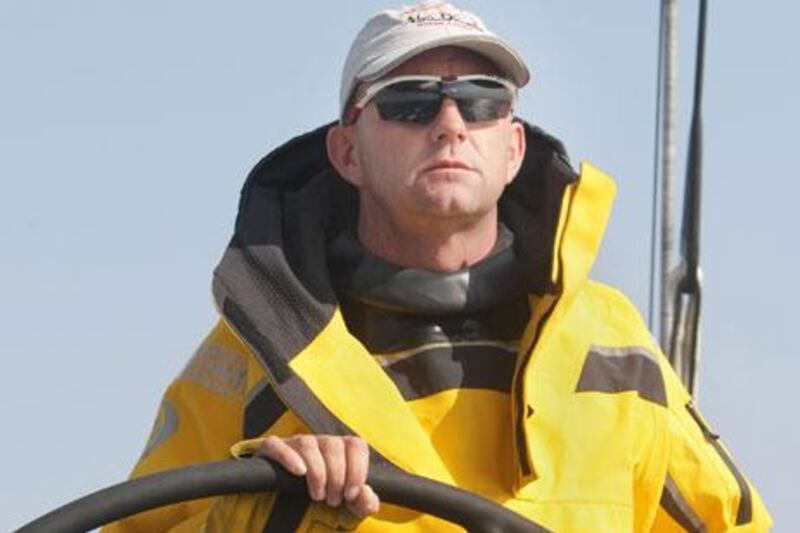That double silver medallist in the garden at the British Embassy on Monday?
The one who helped unfold and raise the London 2012 Olympic flag? The one who told the gathering how he won a "peanut tray" sailing as a nine year old and once at the age of 11 passed a "big white shiny boat" that trained for Olympics and lassoed his imagination?
That's a silver medallist amid one of the most moving Olympic stories yet told, which might ring as hyperbole but isn't.
As the Olympic year lands, and time draws within 200 days, and the flags go up, and we feel relief they remembered to factor in the Leap Day, here comes the usual avalanche of anecdotes.
The plights of the athletes can edify, inspire, make the Olympics exceed its sporting outcomes and - let's be real - counterbalance all the performance-enhancing wretchedness.
The stories can swirl around enough to overwhelm even the people yearning to tell them.
At Sydney in 2000, I saw so many things my head swam, including the dignity of a Moroccan runner crushed with bronze-medal disappointment, and the ninth child of Wyoming dairy farmers upsetting a Siberian Hercules at Greco-Roman wrestling, then likening it to attempting to move a cow.
I just never made it out to sailing, which warranted Ian Walker's words: "Hugely poignant".
The Abu Dhabi Ocean Racing skipper has a singular Olympic timetable.
First, he and sailing partner John Merricks took both silver and lumps in the 470 class at Atlanta 1996.
"I think of John, you know," Walker said, driving from the embassy.
"Atlanta was really strange for us because on the one hand you think about the joy of winning a silver medal and standing on a podium and all that.
"On the other hand we were pretty clear favourites. One thing the Olympics has taught me is favourites don't always win and you're just happy to get out with what you can."
Next, Walker and Mark Covell took both silver and joy in the Star class at Sydney.
In that Olympic way, it had the wonderful trying to gain ground against the terrible.
In October 1997, Merricks had died in a car accident that also involved an uninjured Walker during a competition in Italy.
In December 1998, Covell's sailing partner Glyn Charles had died in the storm that took six lives in the 54th Sydney-to-Hobart.
Both were beloved, Walker describing Merricks as "natural" and "uncomplicated" and "driven" and gentle. In the run-up to mid-September 2000, Walker and Covell fairly floundered.
They finished last repeatedly in a preparatory regatta. The 6ft 7ins Covell sustained burns and injuries when a faulty shower scalded him with water and forced him to break the door glass to exit.
From there on he sailed in pain.
"We were in pieces, 10 days before the Games," Walker said.
They met pivotally with Chef de Mission Rod Carr, who urged them to relax, enjoy the Games.
They curtailed practices, rehearsed only starts. What ensued did seem magical.
In the third-to-last race, last run, trailing 14 boats, skipper Walker urging urgency: "And we came around this top mark on this magical wave," Covell said. He put the mast "way forward," and in "one kinetic moment," he "flew on to the foredeck. Then I remember Ian just sailing so low, so close to the danger point of us breaking, that I felt almost kind of upside-down. They were not normal angles."
Then: "I just remember being in this blur, almost like I was tumbling down the run … Like in a trance. Like in a hypnotic kind of thing. I'm waiting for Ian's call. Any second then we were going to gybe.
"And the next sound I heard was, 'Bang.' It wasn't the bang of the mast breaking. It was the bang of the gun on the finishing line."
They had passed all, three races later they had silver medals, and soon they had one singular ride.
Before they came ashore to meet reporters and tell again how they thought every day of Merricks and Charles, Walker asked for 45 sanguine minutes more.
In a boat Charles designed, they rode around, Covell said, "like two guys floating down a river, literally putting our feet up, lying down in the bottom of the boat. I remember a ferry going past."
Said Walker: "I think of standing at the Opera House, collecting the medal."
Said Covell: "When I leaned down to put my head down to receive the medal, the guy metaphorically lifted the noose off" - the "noose" of pressure - "and put the medal on."
Happy Olympic year, when many imaginary nooses do vanish.





